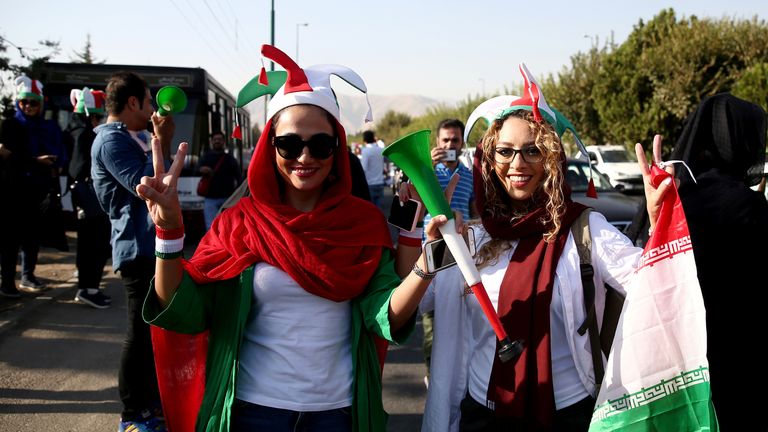Iran and weapons of mass destruction

Farrokhroo Parsa was the primary woman to be appointed Minister of Education in 1968 and Mahnaz Afkhami was appointed Minister for Women's Affairs in 1976. The human rights Organization Amnesty International has reported that it has acquired reviews of a number of instances of rape of women and men detainees in Iran's prisons. On 17 January 2020, Raha Bahreini, Amnesty International's particular reporter on Iran, revealed a case of sexual assault on an Iranian woman who had been detained in Tehran during the protests that erupted after the downing of a Ukrainian passenger plane. After the dying of Khomeini, more practical reforms beneath President Rafsanjani for girls started. Rafsanjani asserted that in Islam, "There aren't any obstacles to training of women in any subject." The three major fields which Rafsanjani targeted on were training, family planning and health, and marriage.

They state that Bush sought up to $four hundred million for these navy operations, which have been described in a secret Presidential Finding and are designed to destabilize Iran's non secular leadership. The covert actions contain support of the minority Ahwazi Arab and Baluchi teams and other dissident organizations. United States Special Operations Forces have been conducting cross-border operations from southern Iraq, with Presidential authorization, since 2007.
It additionally allegedly kidnapped an Iranian nuclear scientist in September 2010. Jundallah is part of a bigger separatist conflict playing out in Baluchi inhabited areas of neighboring Pakistan. Recent analysis has established a common chronological framework for the process of conversion of Iranians to Islam. The data on which Bulliet's research was based limited the validity of this paradigm to generalizations about full, formal conversions in an urban environment.
Moreover, Nesvan e Shargh in Bandar Anzali, Jahan e Zanan in Mashhad, Dokhtaran e Iran in Shiraz, and Peik e saadat in Rasht addressed women's issues throughout Iran. Although the defeat of the constitutionalists (1921–25) and the consolidation of energy by Reza Shah (1925–forty one) destroyed the women's journals and groups, the state implemented social reforms such as mass schooling and paid employment for girls throughout this era.
Reign of the last Shah of Iran
In probably the most publicized context, women have been required, typically against their will, to put on the burqa by the Taliban as a matter of policy during their rule of Afghanistan. When veiling was discussed in early Islamic jurisprudence beyond the context of prayer, it was usually thought of an "concern of social status and bodily security".
There had been no appeals both, and trials typically lasted minutes in an un-orthodox "courtroom". In 1982, the common courtroom system was reinstated, however with the judges now trained in Islamic regulation. The Revolutionary Courts became a part of this court docket system, ruling in issues of "nationwide security" corresponding to drug trafficking and political and "anti-revolutionary" crimes, and have been considered the "judicial arm of the regime". In 1982, in response to navy coup threats, a separate "Military Revolutionary Court" was fashioned, handling army cases.
This edict was later overturned by a Court of Appeal on the grounds of being unlawful. Following a double suicide bombing on 15 June 2015 which killed 33 people in N'Djamena, the Chadian authorities announced on 17 June 2015 the banning of the sporting of the burqa in its territory for security causes. The 2015 Prime Minister, Kalzeube Pahimi Deubet, referred to as the burqa "camouflage." Women who violate this ban are subject to jail time.
Iran–United States relations
In June 2013, the Obama administration expanded its sanctions towards Iran, targeting its auto business and, for the first time, its currency. Trade between Iran and the United States reached $623 million in 2008. According to the United States Census Bureau, American exports to Iran reached $ninety https://asianbrides.org/iranian-women/ three million in 2007 and $537 million in 2008. American imports from Iran decreased from $148 million in 2007 to $86 million in 2008.
Iran and the United States provided conflicting GPS coordinates for the drone's location, making it unclear whether the drone was within Iran's 12-mile territorial boundary. The United States requested a June 24 closed-door United Nations Security Council meeting to deal with the regional tensions with Iran, according to diplomats.
Exceptions to this commonplace have been seen only in the villages and among the many nomads, so women and not using a headband could possibly be found solely among rural individuals and nomadic tribes (like Qashqai). Veiling of faces, that's, covering the hair and the entire face was very rare among the many Iranians and was largely restricted to the Arabs (niqab, battula and boushiya) and the Afghans (burqa). Later, through the economic disaster in the late 19th century beneath the Qajar dynasty, the poorest urban women could not afford headscarves due to the excessive worth of textile and its scarcity.
In autumn 2017, the Danish government agreed to undertake a legislation prohibiting folks to put on "attire and clothing masking the face in such a means that it impairs recognizability". The ban came into force on 1 August 2018 and carries a fine of one thousand DKK, then about 134 euro; repeat offenses are punishable with fines up to DKK. The law targets all clothes that cover the face, such as pretend beards or balaclavas. Supporters of the ban claim that the ban facilitates integration of Muslims into Danish society, while Amnesty International claimed the ban violated women's rights.
עקבו אחרינו ברשת